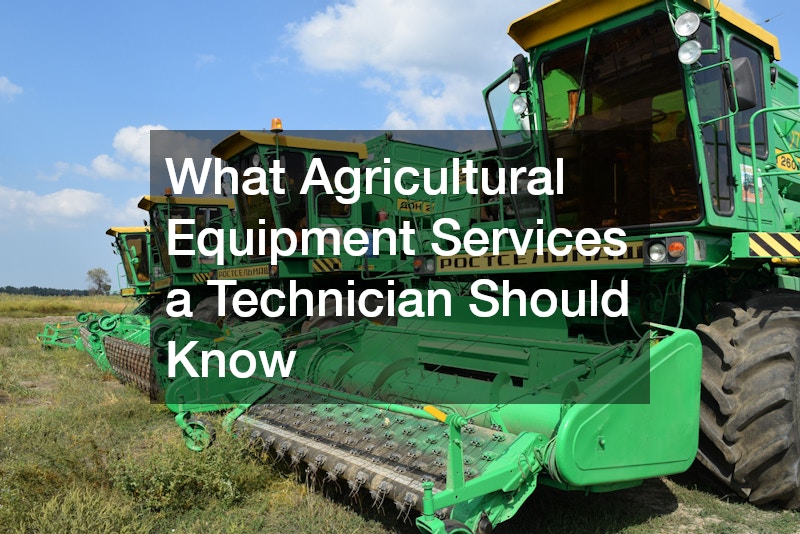
The role of a technician in the agricultural sector is pivotal to ensuring that all machinery operates efficiently, minimizing downtime, and maintaining productivity. With advancements in technology and an ever-evolving agricultural landscape, technicians must possess a comprehensive understanding of various agricultural equipment services. Their responsibilities extend beyond routine repairs; they are the front line in implementing preventative measures, optimizing equipment performance, and integrating new technological solutions into everyday farming practices.
Video Source
As agriculture increasingly leans on precision and automation, the technician’s role has evolved from mechanical troubleshooting to becoming a critical bridge between modern innovation and practical field operations. In this article, we explore the essential agricultural equipment services that every technician should be knowledgeable about.
Diagnosing issues in agricultural machinery requires a systematic approach that encompasses a deep understanding of mechanical, electrical, and electronic systems. Technicians use tools like diagnostic software, multimeters, and oscilloscopes. An awareness of typical wear patterns and signs of failure is essential. Additionally, data from IoT-connected devices can offer insights into machinery performance and potential issues.
The diagnostic process often begins with a visual inspection and continues with a thorough testing of each system within the machinery. A multimeter might be used to test electrical circuits, while an oscilloscope could be employed for more complex diagnostics. By systematically ruling out potential causes, technicians can zero in on the precise source of malfunction.
Moreover, knowledge of typical breakdown patterns for specific equipment models allows technicians to identify common issues more rapidly. Cultivating experience with a wide range of machinery types enhances their ability to spot nuanced problems that might otherwise be missed. This expertise ensures that repairs are accurate and timely, reducing the downtime for farming operations.
Proper maintenance is crucial to extending the lifespan of farming equipment. Regular inspection and servicing of components like engines, hydraulic systems, and attachments are necessary. Technicians engage in routine tasks such as oil changes, filter replacements, and lubrication to ensure optimal performance and longevity of the equipment.
Adhering to manufacturers' maintenance schedules and guidelines is another key practice. Ignoring these schedules can lead to premature wear or unexpected breakdowns, resulting in costly repairs and downtime during crucial farming periods. For instance, following a specified maintenance plan for a combine harvester can significantly reduce the risk of operational disruptions during harvest season.
Furthermore, technicians often employ advanced monitoring tools to preemptively identify potential issues before they escalate. This proactive approach not only reduces the likelihood of unexpected breakdowns but also optimizes equipment performance over time. By meticulously following maintenance protocols, technicians help protect the significant investments that modern farmers make in their machinery.
As technology evolves, so does the complexity of agricultural machinery. Emerging technologies like precision farming, GPS automation, and IoT connectivity necessitate that technicians continually update their skill sets. Understanding software updates and calibrating smart systems are increasingly integral to their responsibilities.
The integration of technology into agriculture — often termed AgTech — means that technicians must be adept at managing data-driven insights. This requires not only skills in traditional mechanical repairs but also familiarity with digital platforms and data interpretation. For example, when dealing with a tractor equipped with telematics, technicians may need to diagnose issues using data transmitted from the field.
This shift emphasizes the importance of ongoing education and training for technicians. Many choose to participate in certification programs and workshops to stay abreast of these technological changes. By acquiring these cutting-edge skills, technicians enhance their ability to provide first-rate service and support to the agricultural industry, ensuring machinery is always ready to meet the demands of farming operations.
A thorough understanding of agricultural equipment services is vital for technicians aiming to maintain productivity and efficiency on the farm. By mastering diagnostic procedures, implementing robust maintenance practices, and adapting to technological advancements, technicians provide invaluable support to the agricultural industry. Their work ensures that complex machinery runs smoothly, safely, and in alignment with both productivity and environmental goals. As farms continue to embrace smart technologies and data-driven systems, technicians who stay informed about emerging trends and equip themselves with cutting-edge skills will remain indispensable. In a field where efficiency and timing are everything, highly trained technicians are not just maintenance providers — they are key enablers of modern agricultural success.
